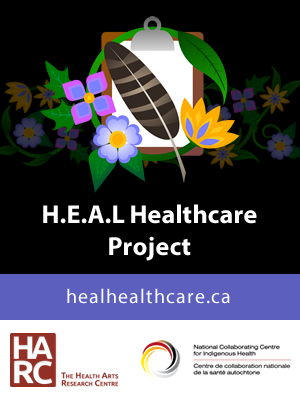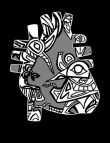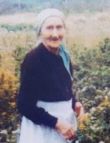Open-access, no-cost anti-colonial learning resource offers art to transform healthcare systems across Canada

August 16, 2024 - Lheidli T’enneh Territory, Prince George, BC
The Hearts-based Education and Anti-colonial Learning in Healthcare (H.E.A.L. Healthcare) Project unlocks the potential of arts and humanities to disrupt longstanding and well-established health disparities. Starting from the premise that healthcare is both an art and a science, H.E.A.L. Healthcare uses poetry, storytelling, visual arts, and other creative tools to confront oppressive healthcare biases, to understand patient experiences, and to humanize healthcare systems and cultures.
H.E.A.L. Healthcare brings together artists, writers, activists, and people with lived experience to create arts-based and anti-oppressive learning materials. H.E.A.L. Healthcare teaching tools are designed to inspire anyone in any healthcare field: healthcare providers and professionals (nurses, dentists, doctors), healthcare staff and administrators, and healthcare students, educators, and institutions.
The open-access and no-cost learning modules are available at HEALhealthcare.ca. This innovative project is a result of a long-standing collaboration between the Health Arts Research Centre (HARC – healtharts.ca) and the National Collaborating Centre for Indigenous Health (NCCIH – nccih.ca).
See full media release here (PDF).
Media contact: Kelsey Chamberlin
Communications Coordinator
Health Arts Research Centre
(250) 960-5438 | harc@unbc.ca
The H.E.A.L. Healthcare Project provides systemic change that is long overdue. I often think about the extractive ways that we talk about cultural sensitivity and cultural competency. The H.E.A.L. Healthcare project addresses internal biases rather than just learning about others. The diverse group of contributors created lessons that everyone can learn from in a kind and gentle way. I think it's going to really change the face of medicine for all of us and improve health outcomes. – X'staam Hana'ax (Nicole Halbauer), H.E.A.L. Healthcare Project Manager
As an anti-colonial medical educator, I believe there needs to be more tools to combat oppressive practices. Every tool on this website asks for self-reflection and internal focus. Health educators and clinicians can benefit from the innovative, art-based tools offered through this website. – Sarah de Leeuw, Canada Research Chair, Humanities and Health Inequities; Research Director, Health Arts Research Centre; Director, National Collaborating Centre for Indigenous Health; Professor, UBC Northern Medical Program (based at UNBC)
The Hearts-based Education and Anti-colonial Learning in Healthcare Project humanizes healthcare systems and cultures in Indigenous communities by creating arts-based and anti-oppressive learning. The project tools help address internal biases within the healthcare industry by understanding patients’ lived experiences and teaching healthcare workers how to practice with cultural compassion – enacting real systematic change. – The Honourable Patty Hajdu, Minister of Indigenous Services
H.E.A.L. healthcare example curricula
 Reckoning with Trans Medical Care through Poetry
Reckoning with Trans Medical Care through Poetry
This curriculum encourages medical practitioners to confront biases and engage in thoughtful listening and writing about gender and poetry to better understand trans experiences.
© 2024 Image credit: Jack Jen Gieseking.
 Udustl’us oosdutat’en-i Beyond Colouring
Udustl’us oosdutat’en-i Beyond Colouring
This curriculum moves your heart and mind through the meditative and calming process of working with beautiful images and responding to open-ended prompts.
© 2024 Image credit: Walker MacKinley.
 Poetry as Medicine
Poetry as Medicine
This curriculum addresses healthcare provider biases through three literary readings from poet and scholar Shannon Webb-Campbell.
© 2024 Image credit: The Webb Family.
H.E.A.L project partners
The Hearts-based Education and Anti-colonial Learning in Healthcare (H.E.A.L. Healthcare) Project is generously supported by Indigenous Services Canada, Canadian Institutes of Health Research, Social Sciences and Humanities Research Council, Michael Smith Health Research BC, Northern Health, and the Northern Medical Program at the University of Northern British Columbia.
The Health Arts Research Centre is a group of learners, researchers and collaborators from diverse disciplinary backgrounds and experience who are interested in synergistic and creative ways to interrogate the determinants of health disparities in the north and to engage in strengths-based visioning and action to address the revival of health, healing and well-being in northern communities
The National Collaborating Centre for Indigenous Health (NCCIH) is a national Indigenous organization established in 2005 by the Government of Canada and funded through the Public Health Agency of Canada (PHAC) to support First Nations, Inuit, and Métis public health renewal and health equity through knowledge translation and exchange. The NCCIH is hosted by the University of Northern BC (UNBC) on the traditional territory of the Lheidli T’enneh in Prince George, BC.